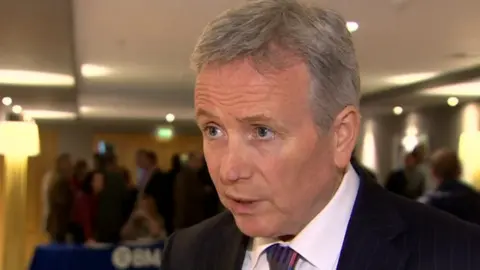Covid-19: High vaccine uptake 'could reduce hospital cases by half'
 PACEMAKER
PACEMAKERCovid-19-related hospital admissions could be reduced by half, if 90% of the population receives a vaccine dose before the end of July, NI's chief scientific adviser has said.
A surge in cases of the virus is expected to peak in NI by late summer, according to the Department of Health.
It comes as NI's mass vaccination centres have begun to offer walk-in appointments with no booking needed.
A further 533 cases of Covid-19, but no deaths, were recorded on Sunday.
On Friday, the last time the department's Covid-19 dashboard was updated, there were 26 people with the virus in hospital in Northern Ireland.
Two of them were in intensive care.
Currently, about 80% of the population eligible for a Covid-19 vaccination has received one dose and more than 60% has received two
The Department of Health said a surge in cases is expected to peak by late summer, and the recent rise in infection numbers reflects the "spread of the now dominant Delta variant".
"Modelling indicates that if we could get to 90% first dose take-up by the end of July, that could reduce hospital admissions by half when the peak comes," said Prof Ian Young.
"This assumes that everyone getting the first dose goes on to get their second dose, and the fuller protection it provides."
 PACEMAKER
PACEMAKERProf Young said that a 90% up-take would mean "hundreds fewer people in hospital" as well as "hundreds fewer suffering serious and potentially life-threatening illness".
However, the chief scientific adviser stressed that modelling is not the same as predicting.
Other factors needed to be considered, said Prof Young, including the extent to which people adhere to public health advice.
"If more people start acting in a way that helps spread the virus, then the peak will likely be more severe," he said.

Walk-in jabs
Anyone over the age of 18 in Northern Ireland will be able to receive a first Covid-19 vaccination without booking an appointment at the following locations:
From Monday
- SSE Arena, Belfast
- Seven Towers Leisure Centre, Ballymena
- South Lake Leisure Centre, Craigavon
From Tuesday
- The Foyle Arena, Londonderry
Omagh Leisure Centre in County Tyrone will be open for first dose walk-ins on 5, 6, 7 July.
The Lakeland Forum in County Fermanagh will be open for first dose walk-ins on 8 July.
All regional vaccination centres continue to offer vaccination appointment bookings for first doses.

Northern Ireland's seven-day incident rate of infection is at its highest level since mid-February.
However, Northern Ireland's vaccine programme is "holding up well" against rising Delta variant Covid-19 cases the chair of a Northern Ireland's doctors' trade union has said.
Dr Tom Black said that despite rising infection rates, the number of people in hospital with the virus remains low.
Earlier this week, Stormont ministers were told that the highly transmissible Delta variant, first detected in India, now accounts for 75% of Covid infections in Northern Ireland.

Speaking to BBC's Sunday Politics programme, Dr Black said that rates were increasing in young people but this was not translating to more people in hospital.
Dr Tom Black told BBC's Sunday Politics programme that the vaccination rate - with 80% of the population having received one dose, and more than 60% having received two - meant "Northern Ireland is holding up well against the Delta variant".
"If you look back to 25 January, we had 798 patients in hospital - we have 20 today," he said.
"We had 74 patients in intensive care at the end of January, we have one or two this week.
"So we've far fewer patients in hospital, we've a lot of infections but thankfully most of them, nearly all of them, are under 60 and most of those are under 40, so much less likely to land in hospital."
Dr Black, who is based in Londonderry, also acknowledged that rates in the north west - both in Derry and County Donegal across the Irish border - were high but that "mixing" will happen.
On Saturday, it emerged that two of the three highest rates for Covid-19 infection in the Republic of Ireland are in Buncrana and Carndonagh areas of east Donegal, near the border with Derry.
"The politicians obviously see a border there between the north and south but the community doesn't, people come up to the north for hospitality - and Derry ones, Northern Ireland, Belfast ones go to Donegal for their holidays."
"I think you have to accept that there's been a lot of hard work and sacrifice by young people, by businesses by hospitality and now's the time to give people some freedom," he told the programme.
'We must push on'
Chief Medical Officer Prof Sir Michael McBride said NI's vaccination programme has been "very successful" and saved "many lives".
"However, the spread of the Delta variant means we are unable to even think about the mission being accomplished," he said.
"We must push on."
Health Minister Robin Swann said the time to get your vaccine "is now".
"Do it for yourself and to protect the people close to you. Do it to protect our health service," said Mr Swann.
"And do it to help us all get back to normality - mixing with friends, nights out, holidays and all the other things we often took for granted before the pandemic struck."
